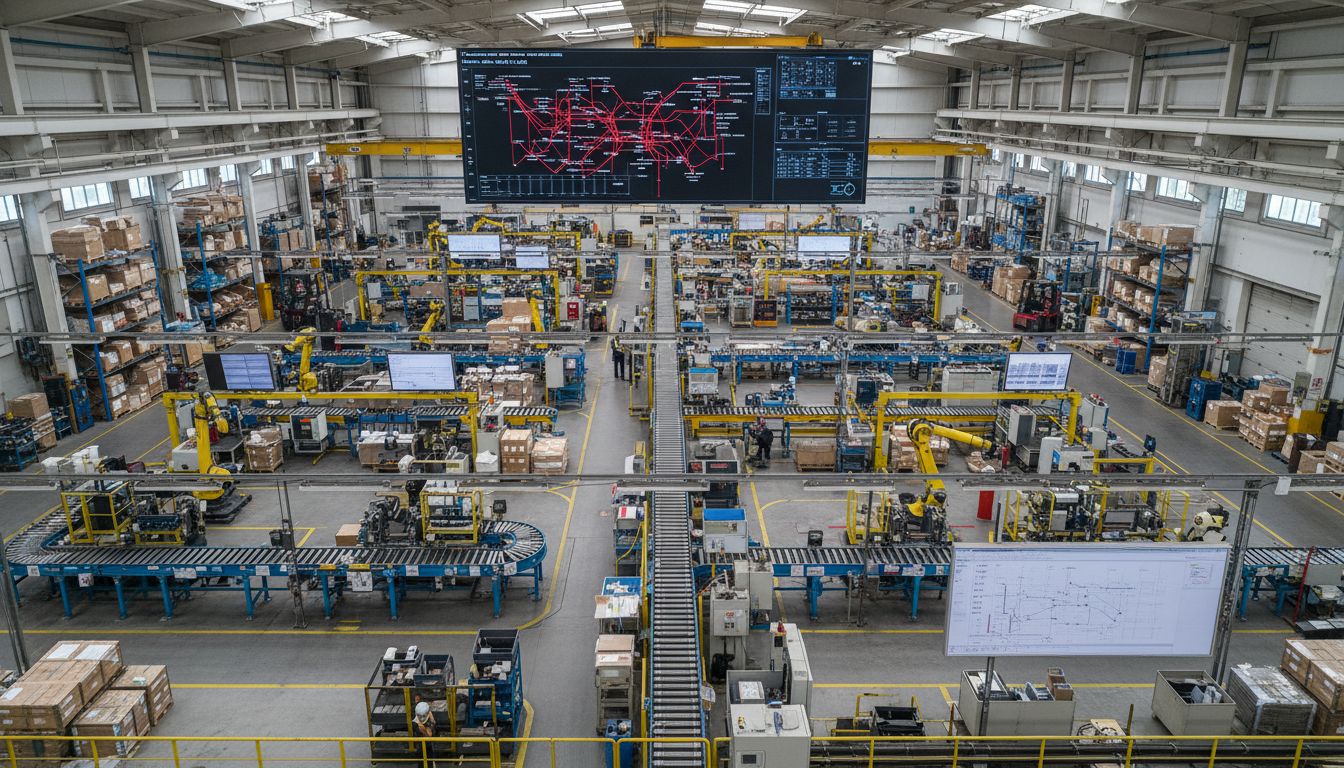Understanding the Role of AI in SMBs for Growth

AI may sound like a sci-fi buzzword, but it is reshaping how small businesses compete and grow. You might expect only tech giants to benefit, yet SMBs using AI are projected to increase their economic value by up to 40 percent by 2030. Surprisingly, the real breakthrough is not in replacing jobs but in handing everyday people sharper tools for smarter decisions.
Table of Contents
- What Is Ai And Its Significance For SbMs?
- Why Ai Adoption Matters For Small And Medium Businesses
- How Ai Enhances Decision-Making And Efficiency In SbMs
- The Impact Of Ai On Customer Experience In SbMs
- Key Concepts And Technologies Driving Ai In SbMs
Quick Summary
| Takeaway | Explanation |
|---|---|
| AI empowers SMBs to compete | Smaller businesses can leverage AI for advanced capabilities that were once exclusive to larger enterprises. |
| AI enhances operational efficiency | Intelligent automation allows businesses to streamline processes and reduce human error, optimizing resource allocation. |
| Personalization drives customer satisfaction | AI helps create tailored experiences, leading to stronger customer loyalty and engagement. |
| Data-driven decision making with AI | AI processes large amounts of data quickly, delivering insights that enable strategic agility and informed choices. |
| AI adoption is crucial for resilience | Implementing AI equips SMBs to respond to market changes and risks more effectively, ensuring sustainable growth. |
What is AI and its significance for SMBs?
Artificial Intelligence (AI) represents a transformative technological paradigm that enables machines to simulate human intelligence, process complex information, and make data-driven decisions. For small and medium-sized businesses (SMBs), AI is not just a futuristic concept but a practical tool for strategic growth and operational optimization.
Understanding AI’s Core Capabilities
At its fundamental level, AI encompasses technologies that allow computer systems to perform tasks traditionally requiring human intelligence. These tasks include pattern recognition, learning from experience, understanding natural language, and making predictive analyses. According to McKinsey research, AI enables businesses to process vast amounts of information rapidly, deriving actionable insights that drive strategic decision-making.
For SMBs, AI’s significance lies in its ability to level the competitive playing field. Smaller organizations can now access sophisticated technological capabilities that were previously available only to large enterprises. Key AI capabilities for SMBs include:
- Automating repetitive administrative tasks
- Generating predictive customer insights
- Enhancing personalized marketing strategies
- Improving operational efficiency
Practical Implementation and Human Centricity
Successful AI integration is not about replacing humans but empowering them. At Average Robot, we believe AI is only average without humans being central to its design and implementation. Business owners must view AI as a collaborative tool that augments human capabilities rather than a standalone solution.
Our approach emphasizes #Humans in Control of AI, which means strategic implementation that aligns with specific business objectives. Learn more about implementing AI strategies that genuinely transform your business operations while keeping your team’s expertise and creativity at the forefront.
By understanding AI’s potential and approaching its adoption strategically, SMBs can unlock unprecedented opportunities for growth, efficiency, and competitive advantage.
Why AI adoption matters for small and medium businesses
In today’s rapidly evolving business landscape, AI adoption is not merely a technological trend but a critical strategic imperative for small and medium-sized businesses (SMBs) seeking sustainable competitive advantage. By embracing AI technologies, SMBs can fundamentally transform their operational capabilities, customer engagement strategies, and overall business performance.
Economic Necessity and Competitive Edge
According to PwC research, businesses that effectively integrate AI can potentially increase their economic value by up to 40% by 2030. For SMBs, this translates into a powerful opportunity to compete with larger enterprises by leveraging sophisticated technological capabilities that were previously inaccessible or prohibitively expensive.
The economic rationale for AI adoption extends beyond potential revenue growth. Key strategic advantages include:

- Reducing operational costs through intelligent automation
- Enhancing decision-making precision with data-driven insights
- Creating more personalized customer experiences
- Identifying new market opportunities faster
Risk Mitigation and Operational Resilience
AI is not just about growth but also about building organizational resilience. Small businesses face unique challenges in resource allocation and risk management, and AI technologies provide sophisticated tools to address these complexities. By implementing intelligent systems, SMBs can:
- Predict potential market disruptions
- Optimize resource allocation
- Develop more agile response mechanisms
- Minimize human error in critical business processes
Our approach at Average Robot emphasizes that AI implementation is not about replacing human talent but augmenting human capabilities. Explore our strategic AI adoption guide to understand how your business can leverage AI responsibly and effectively.
Ultimately, AI adoption represents a strategic investment in your business’s future resilience, enabling SMBs to navigate increasingly complex market dynamics with confidence and precision.
The table below summarizes key areas where AI adoption drives economic and operational value for SMBs, providing a quick comparison of AI advantages discussed in the article.
| AI Benefit | Description | Example Impact |
|---|---|---|
| Cost Reduction | Cuts operational costs through automation and error reduction | Lower staffing or processing expenses |
| Improved Decision-Making | Delivers real-time data insights for precise strategic choices | Faster, more accurate market pivots |
| Personalized Customer Experience | Enables highly tailored offers and engagement through data analytics | Increases customer satisfaction and retention |
| Risk and Disruption Management | Assesses and predicts risks to enhance resilience and minimize human error | Greater agility in volatile markets |
| New Opportunity Identification | Analyzes data to quickly spot emerging trends and market openings | Early adoption, market share growth |
How AI enhances decision-making and efficiency in SMBs
Artificial Intelligence represents a transformative approach to business intelligence, enabling small and medium-sized businesses to make more informed, data-driven decisions with unprecedented speed and accuracy. By leveraging advanced algorithms and machine learning technologies, SMBs can turn complex data into actionable strategic insights.
Data Processing and Predictive Analytics
According to Gartner research, AI technologies can process and analyze vast amounts of data exponentially faster than human analysts, providing real-time insights that drive strategic decision-making. This capability is particularly crucial for SMBs operating in competitive markets where rapid response and strategic agility are paramount.
Key benefits of AI-driven data processing include:
- Rapid identification of market trends
- Accurate forecasting of business performance
- Detection of potential operational inefficiencies
- Early warning systems for potential business risks
Operational Efficiency and Resource Optimization
Intelligent automation powered by AI allows SMBs to streamline complex business processes, reducing manual labor and minimizing human error. By automating repetitive tasks, businesses can reallocate human resources toward more strategic, creative endeavors that drive genuine value creation.
The efficiency gains extend across multiple business domains:
- Customer service automation
- Inventory and supply chain management
- Financial reporting and analysis
- Marketing campaign optimization
Our approach at Average Robot emphasizes that AI implementation is not about replacing human talent but augmenting human capabilities. Explore our practical AI implementation strategies to understand how your business can leverage intelligent technologies effectively.
Ultimately, AI empowers SMBs to make more nuanced, data-driven decisions, transforming raw information into strategic competitive advantage with unprecedented precision and speed.
The impact of AI on customer experience in SMBs
Customer experience has become the critical differentiator for small and medium-sized businesses, and artificial intelligence is revolutionizing how companies understand, engage, and serve their customers. By leveraging sophisticated AI technologies, SMBs can create more personalized, responsive, and intuitive interactions that significantly enhance customer satisfaction and loyalty.
Personalization and Predictive Engagement
According to Salesforce research, 52% of customers expect personalized offers and interactions tailored to their specific needs. AI enables SMBs to deliver these hyper-personalized experiences by analyzing customer data, predicting preferences, and creating targeted engagement strategies that feel individualized and authentic.
Key AI-driven personalization capabilities include:
- Generating individualized product recommendations
- Creating dynamic pricing strategies
- Anticipating customer needs before they arise
- Customizing communication channels and messaging
Enhanced Customer Support and Interaction
Intelligent customer support systems powered by AI transform how SMBs handle customer interactions. Chatbots and virtual assistants can now provide 24/7 support, resolve common queries instantly, and seamlessly escalate complex issues to human representatives. This approach ensures faster response times, consistent service quality, and reduced operational costs.
AI-enhanced customer support offers significant advantages:
- Immediate response to customer inquiries
- Consistent service quality across all interaction points
- Reduced human error in customer communication
- Cost-effective scalability of support services
Discover practical AI implementation strategies for customer experience that can transform how your business connects with customers. Our approach emphasizes using AI to augment human capabilities, not replace the essential human touch that builds genuine customer relationships.
Ultimately, AI empowers SMBs to create more meaningful, responsive, and intelligent customer experiences that drive satisfaction, loyalty, and sustainable business growth.

Key concepts and technologies driving AI in SMBs
Artificial Intelligence represents a complex ecosystem of technological innovations that enable small and medium-sized businesses to transform their operational capabilities. Understanding the fundamental concepts and technologies underpinning AI is crucial for strategic implementation and sustainable business growth.
Machine Learning and Predictive Intelligence
According to NIST research, machine learning stands as a cornerstone technology enabling computers to learn from data without explicit programming. For SMBs, this translates into powerful capabilities that go beyond traditional computational methods, allowing businesses to make more accurate predictions and intelligent decisions.
Key machine learning capabilities for SMBs include:
- Automated pattern recognition
- Predictive analytics for business forecasting
- Dynamic risk assessment
- Adaptive decision-making systems
Natural Language Processing and Intelligent Interactions
Natural Language Processing (NLP) has emerged as a transformative technology that enables machines to understand, interpret, and generate human language. This breakthrough allows SMBs to create more intuitive, responsive customer interaction systems that can comprehend context, sentiment, and nuanced communication.
Practical NLP applications in SMBs encompass:
- Advanced chatbot and virtual assistant technologies
- Real-time translation services
- Sentiment analysis for customer feedback
- Automated content generation and summarization
Explore our strategic approach to AI technology integration that ensures your business leverages these technologies effectively. Our methodology emphasizes human-centric AI implementation, where technological capabilities are carefully aligned with your specific business objectives.
Ultimately, understanding these key AI technologies empowers SMBs to make informed decisions, transforming complex technological potential into tangible business advantages.
This table outlines and compares the essential AI technologies and their business value for SMBs, aiding in understanding their unique contributions.
| AI Technology | Core Functionality | SMB Application Example |
|---|---|---|
| Machine Learning | Learns from data, uncovers patterns, predicts outcomes | Sales forecasting, risk assessment |
| Natural Language Processing (NLP) | Interprets and generates human language | Chatbots, sentiment analysis |
| Intelligent Automation | Automates tasks and workflows | Inventory management, reporting |
| Predictive Analytics | Anticipates future events/trends | Market trend analysis, customer targeting |
Unlock Real Growth for Your SMB With Strategic AI Adoption
Are you struggling to turn AI’s promise into real results for your business? The article highlighted that many small and medium-sized companies face challenges such as keeping up with market changes, managing resources wisely, and using data for smarter decisions. You already know that AI can automate tasks, deliver predictive insights, and personalize customer experiences. But without a clear strategy and the right partner, these benefits often remain out of reach.

At Average Robot, we help you bridge the gap between AI concepts and real business impact. Our experts work side-by-side with business leaders to ensure your team is in control of AI—not the other way around. Explore our hands-on approach to AI integration for lasting operational resilience and competitive advantage. Do not wait for technology to leave your business behind. Connect with us today and discover how you can lead your industry by turning AI ambition into practical wins.
Frequently Asked Questions
How can AI help SMBs automate repetitive tasks?
AI can streamline administrative tasks by using machine learning algorithms to handle data entry, scheduling, and reporting. Start by identifying the tasks that consume the most time in your business—automation can reduce the time spent on these by approximately 30–50%.
What are the benefits of using AI for customer insights in SMBs?
AI can analyze customer data to generate valuable insights into buying behavior and preferences, allowing for more targeted marketing efforts. To leverage this, start collecting and analyzing customer interaction data, which can enhance your marketing effectiveness by over 20%.
How does AI enhance decision-making for small and medium businesses?
AI enhances decision-making by providing real-time data analysis and predictive analytics that can identify trends and potential issues. Implement a system for data collection and review your analytics weekly to make informed decisions more swiftly, improving your response time significantly.
What practical steps can SMBs take to implement AI?
Begin with a clear business goal and identify specific processes to optimize using AI, such as customer service or marketing. For initial implementation, consider starting with one area and expand AI usage in phases, which can lead to noticeable improvements in efficiency within 30 days.
How can SMBs ensure AI implementation remains human-centered?
SMBs can keep AI human-centered by ensuring that implementation strategies prioritize team input and creativity. Engage your employees in the AI integration process and provide training to complement AI tools, fostering collaboration that can enhance productivity and job satisfaction.
What machine learning capabilities are essential for SMB growth?
Key machine learning capabilities for SMB growth include automated pattern recognition and predictive analytics. Start by incorporating one machine learning tool that addresses a specific need, such as sales forecasting, which can improve accuracy by as much as 25%.




